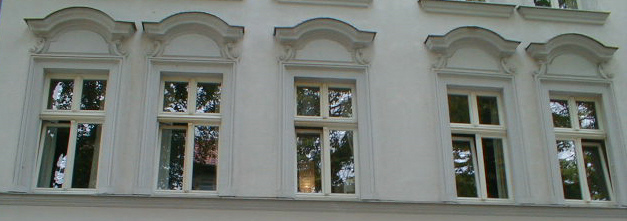Worldwide reading in memory of Mahmoud Darwish on 5 October 2008
… Denk an den Anderen
Denk an den Andern
Wenn du dein Frühstück bereitest, denk an den Andern
und vergiss nicht das Futter der Tauben.
Wenn du in deine Kriege ziehst, denk an den Andern
und vergiss nicht jene, die Frieden fordern.
Wenn du deine Wasserrechnung begleichst, denk an die Andern,
die ihr Wasser aus den Wolken saugen müssen.
Wenn du zu deinem Hause zurückkehrst, deinem Hause, denk an den
Andern und vergiss nicht das Volk in den Zelten.
Wenn du schlafen willst und die Sterne zählst, denk an den Andern,
der hat keinen Raum zum Schlafen.
Wenn du dich mit Wortspielen befreist, denk an den Andern
und denk an jene, die die Freiheit der Rede verloren.
Wenn du an die Anderen in der Ferne denkst, denke an dich,
und sage : wäre ich doch eine Kerze im Dunkeln.
- Mahmoud Darwish: 2005 / Übersetzer: : Hakam Abd al-Hadi
The Berlin International Literature Festival is appealing for a worldwide reading of Mahmoud Darwish's poetry on 5 October 2008. The activities accompanying this event are designed not only to honour the poet's body of work but also his commitment to promoting peaceful and fair coexistence between Arabs and Israelis. This appeal is directed at cultural institutions, radio stations, schools, universities, theatres and all other Darwish enthusiasts the world over.
Mahmoud Darwish was one of the best-loved Arab lyricists of modern times and counts among the most eminent poets in the history of world literature. Thousands flocked to hear his readings, and his volumes of poetry have been published in the hundreds and thousands. Numerous pieces have been translated into more than 30 different languages. His poems have been transformed into folksongs and many of his verses have taken on the character of proverbs. Darwish's poetry draws inspiration from the tradition of ancient Arab poetry and Modernist influences and borrows from the style and language of both the Qur'an and the Bible. Few other poets have displayed such dedication to articulating a vision of a meaningful, real and fair peace between Arabs and Israelis, which furthers a dialogue between two voices and two different outlooks on life, while ensuring that one does not impose its view upon the other.
In the tradition of ancient Arab poetry, the poet assumes the role of spokesperson for his people. And despite Darwish's move away from this role since the 1990s, many readers still viewed him as Palestine's literary ambassador to the last.
Mahmoud Darwish was born in 1941 in the village of Al-Birweh near Acre. In 1948, he fled to Lebanon and returned after the foundation of the state of Israel. He worked as an editor for various political and cultural journals in Haifa. After being imprisoned on numerous occasions, he left Israel in 1970 and went into exile. He has lived in Moscow, Cairo, Beirut, Paris and, most recently, in Amman and Ramallah. In 1987, he was elected to the executive committee of the Palestine Liberation Organization and helped draft the Palestinian Declaration of Independence in 1988. He left the organization in 1993 in protest against the signing of the Oslo Accords. He received numerous awards, including the Lannan Prize for Cultural Freedom in 2001 and the Erich Maria Remarque Peace Prize in 2003. Darwish died on 9 August 2008 following heart surgery. He was buried in the West Bank city of Ramallah and granted a state funeral.
The appeal has been signed by:Hector Abad, Colombia; Tariq Ali, Pakistan; Amal al-Jubouri, Iraq/Germany; John Ashbery, USA; Margaret Atwood, Canada; Daniel Barenboim, Argentina/Germany; Bei Dao, China/USA; Mohammed Bennis, Morocco; Philipp Blom, Germany/Austria; Rachid Boudjedra, Algeria; Breyten Breytenbach, South Africa; André Brink, South Africa; Monika Carbe, Germany; Dilip Chitre, India; John M. Coetzee, South Afrika; Edgardo Cozarinsky, Argentina; Nuruddin Farah, Somalia/South Africa; Enrique Fierro, Uruguay; Jon Fosse, Norway; Antje Grabenhorst, Germany; Nadine Gordimer, South Africa; Ha Jin, China; Qassim Haddad, Bahrain; Milton Hatoum, Brazil; Seamus Heaney, Ireland; Mofidul Hoque, Bangladesh; Jabbar Yassin Hussin, Iraq/France; Nancy Huston, Canada/France; Elfriede Jelinek, Austria; Adel Karasholi, Syria/Germany; Navid Kermani, Germany; Friedrich Kröhnke, Germany; Abdellatif Laabi, Morocco/France; Zakes Mda, South Africa; Pauline Melville, Guyana/Great Britain; Paul Muldoon, Northern Ireland/USA; Charl-Pierre Naudé, South Africa; Claudia Ott, Germany; Michael Palmer, USA; Shailja Patel, Kenya; Jean Portante, Luxemburg; Fernando Rendón, Colombia; Alberto Ruy-Sánchez, Mexico; Joachim Sartorius; Germany; K.S. Satchidanandan, India; Nasrin Siege, Iran/Germany; Wole Soyinka, Nigeria; Shashi Tharoor, India; Lina Tibi, Syria; Tzvetan Todorov, Bulgaria/France; Anne Waldmann, USA; Marina Warner, Great Britain; Eliot Weinberger, USA; Renate Welsh-Rabady, Austria; Yang Lian, China/Great Britain
“Mahmud ist fort. Das Exil ist vorüber“, schrieb Breyten Breytenbach kurz nach dem Tod des großen palästinensischen Dichters Mahmud Darwisch. „Für uns alle“, so Breytenbach, „war er ein Maßstab. Vielleicht bleiben wir irgendwo stehen, weil wir über uns Vogelgeflatter hören, und wir halten schützend eine Hand über unsere geblendeten Augen, während wir den Himmel absuchen. In diesem Rhythmus der Vögel wird er für mich fortleben.“ Frank Arnold, Volker Braun, Margarita Broich, Leila Chammaa, Tina Engel, Kathleen Gallego Zapata, Astrid Gorvin, Qassim Haddad, Amal al-Jubouri, Marel Khalifa, Adel Karasholi, Naomi Krauss, Jutta Lampe, Geno Lechner, Marie Löcker, Julia Malik, Chun Mei Tan, Friedhelm Ptok, Joachim Sartorius, Roland Schäfer, Nina West u. a. lesen Gedichte von Darwisch in deutscher Übersetzung. Claudia Ott würdigt den Autor und zeichnet die Stationen seines Lebens nach.
Es werden Übersetzungen von Hakam Abdel-Hadi / Rüdiger Vorbrüggen, Evelyn Agbaria, Mustafa Al-Sleiman / Volker Braun, Christine Battermann, Farouk S. Beydoun, Johanna und Moustapha Haikal, Adel Karasholi, Khalid al-Maaly / Heribert Becker, Stephan Milich, Angelika Neuwirth, Günther Orth, Claudia Ott, Annemarie Schimmel und Stefan Weidner gelesen.









